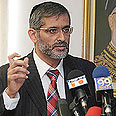
Party platform:
- Party pledges to set objectives for minimizing unemployment and rewarding employers. Assistance to women and sectors in need of support. The formulation of a socioeconomic convention in order to create a common denominator for all market forces.
- Integrating Jewish tradition into the education system. The doctrine guiding the party's platform is that Israel is the Jewish people's state and Jewish identity must be preserved when it comes to decision making, while curbing moves that would see "a country of all its citizens" emerging. The party does not call for a state based on religious law, but rather, "a state with a Jewish soul" where Jewish character is preserved within state laws.
- Every diplomatic question on the agenda has answers in Jewish law. The party's spiritual leader, Rabbi Ovadia Yosef, determines the party's official position. Yosef and other leading rabbis believe territorial compromise is allowed, but only when life is at stake and something is received in return.
Party history:
The Sephardic religious party was established in 1984 to counter a sense of discrimination among Sephardic (Middle Eastern descent) religious Jews vis-a-vis Ashkenazis (European descent.) Since its formation, the party's strength kept on growing, until in 1999 it won 17 Knesset seats, an achievement that to a large extent changed the political balance of power in Israel.
The movement runs an independent education system in the framework of non-profit organizations, which also had a significant part in the party's rise.
The party's spiritual leader has been Rabbi Ovadia Yosef since 1990. The party's most well-known leader was Arieh Deri, who at one point served as Interior Minister. Later, Deri was convicted, jailed and quit the party and political life, replaced by Eli Yishai the current party leader.
Following the 2001 elections, Shas joined the Likud government and received several portfolios. Internal struggles, as well as changes in Israel's political climate, saw the party go down to only 11 Knesset seats in the 2003 elections. For the first time in its history, the party did not join the coalition and remained outside Ariel Sharon's government.
Notable figures:
Eli Yishai
Shlomo Benizri
Yitzhak Cohen
Amnon Cohen
Nissim Ze'ev















